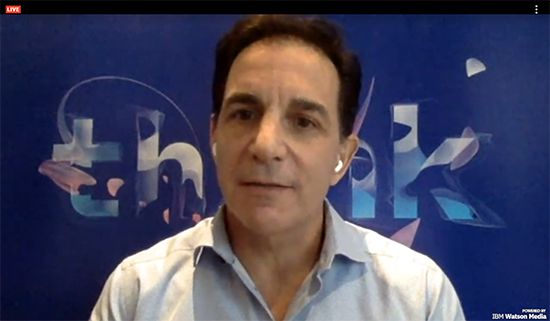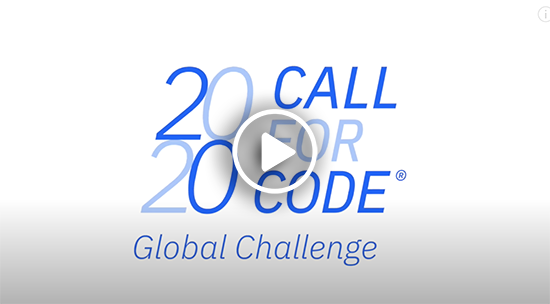THINK 2020 stories
Think Digital: Day 1 Highlights
By Greg Golden, Elissa Gootman and Ronald Gordon
May 5, 2020
IBM’s Think Digital virtual conference got off to a strong start on Tuesday. The agenda included keynote addresses from top IBM leadership; announcements about new offerings; and client presentations about how AI, cloud and other technologies have enabled them to rise to the challenges of the global pandemic. There were also sessions by influential contributors like international human rights lawyer Amal Clooney and entrepreneur/investor Caterina Fake. Here are some highlights from the day:
IBM CEO Arvind Krishna: A Turning Point for Digital Transformation
The COVID-19 pandemic has been a “turning point” for many companies, as the disruption and uncertainty caused by the crisis has accelerated the digital transformation that for many was already underway, IBM CEO Arvind Krishna said in his keynote presentation Tuesday.
“There is no question that this pandemic is a powerful force of disruption and an unprecedented tragedy,” Krishna said. “But it is also a critical turning point. It’s an opportunity to develop new solutions, new ways of working, and new partnerships that will benefit your company and your customers, not just today, but for years to come.”
“I’m predicting today that every company will become an AI company—not because they can, but because they must,” Krishna continued.
--------

Ginni Rometty and will.i.am: The Need for Digital Inclusion
In a conversation with the businessman, philanthropist and Grammy-winning musician will.i.am, IBM’s executive chairman, Ginni Rometty, asked him what he thought might be the greatest lesson to emerge from the COVID-19 crisis. “The world is super fragile,’’ will.i.am answered. “You took for granted the people at the supermarket, the people that clean the streets and took out the garbage. The delivery service folks. And it turns out those people are the most important people in society. That’s what I learned. And now in this digital age, what I learned is that we have to be more human. Everyone matters.”
Rometty agreed, saying that despite the current troubles, she remains optimistic. “There is a way to make this digital era not only human,’’ she said, “but inclusive for everyone.”
--------
IBM President Jim Whitehurst: Open Architecture Is Key
The global pandemic has provided a stress test to organizations everywhere, underscoring the critical need for open technology architectures to help manage through even the most challenging business environments, IBM President Jim Whitehurst said during his keynote presentation.
The disruption caused by COVID-19 has shown why it’s so important for businesses to be capable of moving IT workloads whenever, wherever they're needed, Whitehurst said. “Now, more than ever, we see a dire need for speed, agility and flexibility.”
--------
Adapting to Emerge Stronger
Bridget van Kralingen, IBM Senior Vice President for Global Markets, opened her session with a call for compassionate leadership as business begins to bounce back from the pandemic. She urged attendees to engage clients in new ways and to lead with empathy and courage, recognizing that the recovery will be progressive and take time.
In her session, van Kralingen discussed the importance of building business resilience and agility at scale. “There is adapting to survive, and there is adapting to emerge stronger,” she said. “Adapting to survive is about grit. Adapting to emerge stronger is about resilience. And IBM will be with you every step of the way.”
As an example, van Kralingen pointed to IBM’s partnership with Children’s Healthcare of Atlanta. Using Watson Assistant for Citizens, in less than one day IBM enabled citizens and employees to access important COVID-19 information. IBM also deployed a Watson pediatric assessment tool with pre-trained content to help parents identify children’s COVID-19 risks—freeing Children’s Healthcare professionals to focus on patients.
--------
A Conversation With Amal Clooney
Amal Clooney, a world-renowned voice for neglected and exploited groups, is co-founder of the Clooney Foundation for Justice, a global initiative advancing awareness about and accountability for human rights abuses. On Tuesday, she noted similarities between the global health and human rights crises, and offered three guidelines for combating both:
• Silencing the truth is deadly – Whether in the suppression of early warnings about the coronavirus or the demonization and persecution of journalists and the media, truth is under fire around the world. This dangerous precedent is stifling the creation and continuation of free societies.
• Global problems need global solutions – Global cooperation, and the sharing of data and expertise, is the only viable path to overcoming the challenges of a connected world – whether they involve curing pandemics, managing humanitarian upheavals or defeating terrorism.
• We all have a part to play – Public-private partnerships can be a model for change, as each of us needs to engage in helping solve our universal problems.
-------
Addressing New Cybersecurity Risks
Among the challenges COVID-19 has brought are new threats in cybersecurity. Mary O’Brien, General Manager of IBM Security, addressed these risks in her session, noting that since February there has been an 84 percent increase in the use of remote working tools such as video conferencing and virtual private networks (VPNs). Over that same period, she noted, IBM’s X-Force Security Intelligence team reports a 14,000 percent increase in phishing and spam attacks.
O’Brien was joined by Wendi Whitmore, Vice President of IBM’s X-Force Security Intelligence team, who outlined a five-point plan for making sure organizations stay safe and resilient during COVID-19 and beyond. The five points include rehearsing incident responses, protecting devices, using multi-factor authentication, backing up critical data at an offline location and protecting email.
George Eapen, Global CIO and CISO at the oil and gas company Petrofac, gave his perspective on how to extend security quickly and remotely. Eapen told the audience that there is real opportunity for security teams to help their businesses change the way they work. This requires rethinking how they operate, he said, and using the current moment to change legacy workways while lowering costs.
--------

Partnering With Developers
Bob Lord, Senior Vice President for Cognitive Applications, Blockchain and Ecosystems at IBM, said in his session on Tuesday that he views the developer community as the greatest hope for building solutions at scale that will improve businesses—and our planet. Lord said IBM is looking to drive an active partnership with developers, with IBM seeking to understand what developers are building for tomorrow and offering them a way to rapidly learn, code and adopt the latest technologies.
"Now, more than ever, the world needs developers to fight back," Lord said. "Developers can help save lives."
-------
Three Initial COVID-19 Call for Code Winners
To illustrate IBM’s commitment to a better world, Bob Lord was joined by developers from Morgan Stanley and Prometeo, past winners of the Call for Code Global Challenge. In March, IBM expanded the most recent Call for Code Global Challenge to address the effects of COVID-19, asking developers to create solutions in three areas: crisis communications, remote education and community cooperation.
Developers responded: Immediately following the session, IBM and Chelsea Clinton, Vice Chair of the Clinton Foundation, announced three top solutions with the potential to help mitigate the devastating impact of COVID-19:

Watch the Top 3 Call for Code COVID-19 Initial Solutions
• The Are You Well? app, created by a team from Altran in India, is designed to be a comprehensive medical assistance system that could reduce the stress on over-taxed medical systems.
• CovidImpact, a predictive assessment tool created by a global team that came together at the University of British Columbia, uses IBM Watson Tone Analyzer linguistic analysis and IBM’s ILOG CPLEX rules engine for decision-making—aiming to reduce the financial impact of COVID-19 on small businesses.
• Safe Queue, created by a developer in Los Angeles, is a community-driven mobile app that is intended to replace physical lines at shopping centers, small businesses and polling places with on-demand virtual lines, to enable a safer way to manage entry during COVID-19.
--------
Caterina Fake: The Tech Effect on Humanity
Caterina Fake is an entrepreneur, tech investor, host of the podcast “Should This Exist?” and longtime advocate of holding entrepreneurs responsible for the outcomes of their technologies. To do that, Fake focuses on how technologies are created, with an emphasis on recognizing and incorporating a diversity of human perspectives to ensure that technology serves all.
“Humanizing technology is an art and not a science,” she said.
On Tuesday, Fake outlined eight core principles for helping to ensure that technology products and services are both commercially viable and culturally inclusive. Among them were empowering employees to speak up and “bring their ethics to work,” encouraging “cognitive diversity,” making sure that the “right people are in the room” when creative decisions are being made, and a willingness to make corrections even if a project is well underway.